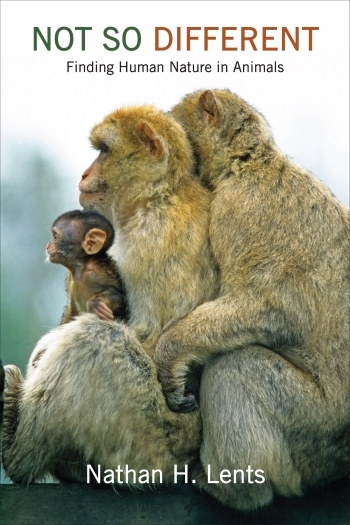Not So Different: Finding Human Nature in Animals
“Once you strip away the cultural and psychological aspects of our emotions and behaviors and examine them through the cold hard lens of Darwinian fitness, you see that our “advanced cognitive powers” are really a smoke screen clouding very simple behavioral programs that we share with our fellow primates.” — Nathan H. Lents.
This week, our featured book is Not So Different: Finding Human Nature in Animals, by Nathan H. Lents. Today, we are happy to present the books introduction, in which Lents lays out his project and explains what he hopes to achieve.
Don’t forget to enter our book giveaway for a chance to win a free copy of Not So Different!
Not So Different: Finding Human Nature in Animals
By Nathan H. Lents
Both the title and the cover photo of this book are something of a head fake. You’re probably thinking that the book is all about animal behavior. But it’s not, except that it is. Let me explain.
The questions that drove me to write this book are: Why do we humans act the way that we act? Why do we build the societies the way that we do? Are we evolved to behave this way?
The problem with those questions, however, is that they are very difficult to ask because human behavior is largely a product of culture and social milieu. The genetic basis for our behaviors are hard to separate from the environment in which we learn to behave. How can we ever know if and how evolution shaped us to act?
This is where the animals come in. Because animal behavior takes shape in a much simpler cultural context, their behaviors can be seen as a somewhat more “pure” manifestation of the underlying drives, urges, and emotions that drive them to act. Through observation of animal behavior in the wild, in zoos, and in research laboratories, scientists have been able to understand the value of individual behaviors. Through gentle manipulation, we can even test those hypotheses.
Behavior, like anatomy or gene function, is the product of natural selection. Any behavior that is genetically programmed must be beneficial to the animal (or her close kin) for it to have been selected and shaped by evolution. Through evolutionary time, behaviors are nipped and pruned just like muscles and bones, never quite reaching perfection but always working for the survival and reproduction of the animal.
Each chapter of the book takes a different aspect of human behavior or emotion, say, empathy, grief, jealousy, or communication, and explores its existence in other animals, especially our closest relatives. Then, I attempt to dissect the evolutionary benefit by examining how that emotion or behavior serves the animal well in the great struggle of life. You may be surprised to learn, as I was, that the phenomenon of grief is actually a big help to animals in surviving loss. While it may seem obvious that jealousy drives animals to protect their genetic interests, it’s not so obvious how empathy and compassion does also.
By learning about animal behavior, we learn about human behavior. The recurring theme of the book is how similar animal and human behavior really is at the core. Once you strip away the cultural and psychological aspects of our emotions and behaviors and examine them through the cold hard lens of Darwinian fitness, you see that our “advanced cognitive powers” are really a smoke screen clouding very simple behavioral programs that we share with our fellow primates.
There is much to be gained by understanding human behavior in this way. As I write in the introduction, “Understanding where sibling rivalry comes from can help us disarm it and thus get along with our siblings better. Understanding the biological basis of grief can help us recover from our own grief as well as help others to do so. Understanding that humans have a moral foundation built into us through our history as social mammals can help us discover ways to build a more moral society, regardless of religious, national, and ethnic differences.”
Ultimately, this is a book about the mind, so I end the book with a short chapter of speculations on animals minds. Many people balk at the notion that animals even have minds, but I find that to be preposterous because they certainly behave as if they do. While we cannot access animal minds, nor can they tell us about them, that doesn’t mean they don’t exist. For some reason, the notion that animals have minds and a rich inner experience became controversial and was considered unscientific around the middle of the 20th century. Thankfully, we are beginning to emerge from that darkness. I end with a quote from Charles Darwin himself on this matter: “…the difference in mind between man and the higher animals, great as it is, certainly is one of degree and not of kind.”






